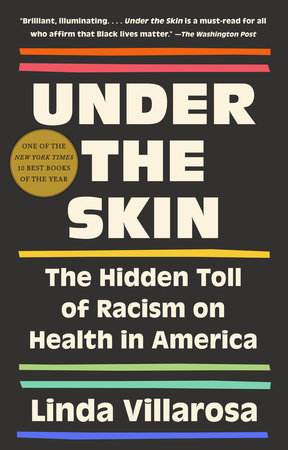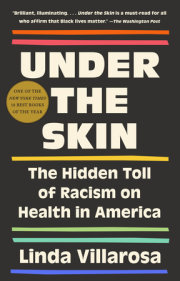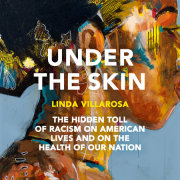Chapter One
Everything I Thought Was Wrong
Although the United States has the most advanced medical technology in the world—and spends more on health care than anywhere else—we lag behind all other wealthy nations in key measures of health that serve as a proxy for our overall well-being. It starts at birth and ends with death.
The United States has the highest rate of infant mortality and the lowest life expectancy in comparison with other wealthy countries. An American woman is more likely to die as a result of pregnancy and childbirth than women in other countries of comparable wealth. That rate is higher now than it was in the 1990s, even though most of these deaths of mothers are avoidable.
The poor health outcomes of the world’s wealthiest nation are often presented as a mystery, yet their root causes are hiding in plain sight: these disparities are driven by inequality and discrimination, which lead to poor health in people of color in the United States, particularly African Americans. The health outcomes of Black Americans are by several measures on par with people living in far poorer nations. At every stage of life, Blacks have poorer health outcomes than whites and, in most cases, than other ethnic groups. Black babies are more than twice as likely as white babies to die at birth or in the first year of life—a racial gap that adds up to thousands of lost lives every year. Blacks in every age-group under sixty-five have significantly higher death rates than whites. Black life expectancy at birth is several years lower than that of whites. African Americans have elevated death rates from conditions such as diabetes, stroke, and heart disease that among whites are found more commonly at older ages. In a phrase, African Americans “live sicker and die quicker,” which, if you estimate years of life lost because of deaths that could’ve been prevented, adds up to tens of thousands of lost years.
Too often this story of inequity and disadvantage in health gets dismissed as “only” affecting the poor, or being one of class, not race. It is indisputable that poverty creates emotional disruption, inequality, and fear. Health-care facilities in lower-income communities are often underfunded and left to waste away. The poorest communities lack access to healthy food, clean water and air, and outdoor space—as well as jobs, safe living conditions, and quality education. This in itself is unfair and tragic and affects people of all races and ethnicities who live in pockets of rural, urban, and suburban poverty across the country. Too frequently, rather than taking into account these structural inequities, we blame the individuals, by insisting they wouldn’t be poor if they worked harder and wouldn’t be sick if they were educated and simply took better care of themselves.
However, poverty is not the sole factor in who gets sick and who doesn’t, in who survives and who passes away; it just makes the situation that much worse. Even when income, education, and access to health care are matched, African Americans remain disadvantaged and racial disparities in health cut lives short. College-educated Black mothers, for example, are more likely to die, almost die, or lose their babies than white mothers who haven’t finished high school.
I am a Black American and have been a journalist and author in both ethnic and mainstream media for several decades. Most of my work has looked at the health of African Americans, particularly Black women, and at racial health disparities. Of course, I have long understood that
something about being Black has led to the documented poor health of Black Americans. But in recent years I have come to understand that much of what I believed about health disparities and inequality in the United States was wrong. The
something that is making Black Americans sicker is not race per se, or the lack of money, education, information, and access to health services that can be tied to being Black in America. It is also not genes or something inherently wrong or inferior about the Black body. The
something is racism. Income, education, determination, and self-empowerment can help individual Black Americans but cannot entirely erase the negative effects of centuries of discrimination, and ongoing bias, on the health of African Americans. To put it in the plainest terms, from birth to death the impact on the bodies of Black Americans of living in communities that have been disadvantaged by long-standing racial discrimination, of a deeply rooted and dangerous racial bias in our health-care system, and of the insidious consequences of present-day racism affects who lives and who dies. These factors create physical vulnerability and systemic disadvantage that education, income, and access to health care cannot erase. This inequality, born more than four hundred years ago and embedded in every structure and institution of American society, including the health-care system, is driving our country’s poor national health outcomes relative to the rest of the developed world. It has taken me three decades of reporting on the health of African Americans and several disturbing personal medical crises to understand the ways discrimination and bias contribute to poor health outcomes primarily in African Americans, but in reality in all oppressed people.
In the mid-1980s, I became a contributing nutrition and fitness writer for
Essence magazine, and eventually the publication’s health editor. Like so many other Black women before and after me, I remember seeing
Essence at my grandmother’s bedside and on my mother’s coffee table when I was growing up. It was first published in 1970, during the intersection of the Black Power and women’s liberation movements and served as a bible for Black women. The mission, instilled in everyone on the staff by our editor in chief, Susan L. Taylor, was clear: in a world full of negative representation and damaging mythology, give Black women positive images of themselves and empower what would eventually grow from a circulation of fifty thousand to more than one million and a reach of more than eight million women and some men with information about relationships, finances, careers, travel, family, spirituality, food, health, and, most important, self-love and acceptance, to make their lives better.
At
Essence, my personal mission was unambiguous: fix the health crisis in Black America. At the time, from the late 1980s to the end of the last millennium, I understood that Black America was experiencing a life-crushing constellation of health problems; Black people were contracting serious illnesses at younger ages than other Americans and living fewer years. I was sure, as so many others believed then and still believe today, that poverty was solely to blame. In 1985, I was transfixed by the Heckler Report, issued by the U.S. Department of Health and Human Services (HHS) and released that October, which took a research deep dive into racial health disparities. The ground-shattering document was pulled together by a nineteen-member task force of senior scientists and officials at HHS who analyzed existing data about race, death, and disease in the United States. They examined the underlying factors and consulted with experts outside the government who specialized in the health of people of color. This publication marked the first time the government had comprehensively studied the health status of people of color, and it elevated the issue of health inequality to the national stage. I ordered a print copy of the 239-page study and read it like a novel.
Named for the HHS secretary at the time, Margaret Heckler, the report estimated that there were more than eighteen thousand “excess deaths” each year among Blacks because of heart disease and stroke, compared with the number of deaths that would occur if their health was on par with that of whites. It also pointed to 8,116 excess deaths from cancer, 6,178 from infant mortality, and 1,850 from diabetes. It made me ache to consider the thousands of Black men, women, and babies dead every year from medical problems we knew how to prevent and treat. Heckler, a pro-life Reagan Republican, called this shameful inequality “an affront both to our ideals and to the ongoing genius of American medicine.”
The Heckler Report recommended no new government funding to attack the crisis. The report did discuss what we now call the “social determinants of health,” conditions like poor housing, crime, pollution, shortage of healthy food, and lack of medical services that affect mental and physical health. But it neglected to mention the Reagan administration’s cutting or freezing federal dollars for Medicaid, food stamps, family planning, and other supportive services, which would make health disparities grow, not shrink. Heckler insisted that “money was not the answer.” There was no mention of discrimination and bias either inside or outside the medical-care system. Instead, the report advised Black Americans to save themselves by improving their health through education, self-help, and self-care. The government’s role was to bolster data collection and communication between agencies and expand health education. Heckler stated the blame bluntly at a press conference following the release of the report: “Progress depends more on education and a change in personal behavior than it does on more doctors, more hospitals, or more technology.”
Within this largely well-meaning report lurked the assumption that Black people, individually and collectively, were irresponsible, careless, uneducated, and making thoughtless choices that led to this health crisis in the first place. Edith Irby Jones, MD, then the president of the National Medical Association, the professional organization for Black physicians, called out Heckler on this point in a 1986 essay in her group’s journal. Dr. Jones wrote that Heckler’s “implication, of course, is that if Black people would only ‘behave’ their health problems would be solved . . . Well, as Black Americans we know it is not as simple as that. Blaming the patient will not cure the ills of America’s underserved minorities.” She also recommended “
hope in place of hopelessness,
service in place of self-serving moralizing.”
At the time, I didn’t question the report. I was excited to see a document full of evidence of racial health disparities, developed by experts and blessed by the federal government, and used it as a mandate, firmly believing that if we—Black Americans—know better, we do better. The report also dovetailed perfectly with my own belief in self-help and the mandate of the magazine. I approached
Essence’s mission with passion and steely focus, through a Washingtonian (Booker T.) lens of individual self-improvement—helping people help themselves and uplifting those who couldn’t. I never strayed from the belief that people had the power to save their own lives in the face of the health disparities described in detail in the Heckler Report. I understood that my life’s work at the time was to provide our readers with solid, practical self-help information about diet, exercise, and other kinds of self-care so individuals could be healthier, which would raise the health status of the entire Black community. I imagined a kind of trickle-down effect from the health information our magazine provided: I promoted an each-one-teach-one mentality that encouraged readers to make sure all the “sisters” in the lives of our largely middle-class audience (read: your less educated and privileged friends and family) understood the importance of good health and how to achieve it. It was us and them—us, the educated middle-class Blacks like me and my relatives, and them, the economically challenged Blacks whose image shone brightly in full-spectrum dysfunction in the American media, then as now dominated by upper-middle-class, largely white male producers, editors, reporters, and writers. At
Essence, our staff of mainly Black women did not just feel responsible for those less fortunate Blacks; we were actually tasked with saving them. I recall being in an
Essence staff meeting where our editor explained that each of us was responsible for the lives of eight Black women. I remember coming home late one night, and as I was walking up the subway steps, exhausted on my way back to Brooklyn from Manhattan, I thought, “No wonder I’m so tired. I’ve got eight women tethered to me, and I just dragged them up the stairs!”
The Heckler Report’s conclusions also fit comfortably with what I’m ashamed to admit were my own narrow views of Black communities in America. While I wasn’t crass enough to blame poor African Americans for their plight, I fell prey to limiting, media-driven stereotypes of Black people. I had spent my early years growing up on the South Side of Chicago in the all-Black neighborhood near where my mother had been born and raised, and we lived in a building my grandparents owned. As a child, I was influenced by my parents’ complaints about Chicago and whisper-hiss conversations about how they needed to
get out of the city and start their own life. By the time I was in third grade, the city’s homicide rate had more than doubled from a decade before, and nearly a third of all Black residents lived below the poverty level. At first, my parents wanted to move to a predominantly white suburb near my father’s job as a bacteriologist at Edward Hines Jr. VA Hospital. But while looking for a home, my mother asked a police officer if the area would be safe for a Black family, and he told her, “I can’t guarantee that we could protect you and your family.” Finally, in 1969, my father requested a transfer to Denver, and my parents packed up our Rambler station wagon and moved the family to the suburb of Lakewood, Colorado. We were part of a larger trend of Black suburbanization that began to reverse the tendency of Chocolate Cities and Vanilla Suburbs. In the 1970s, the overall Black population in American suburbs increased by 70 percent as African American families like mine moved to the suburbs, taking advantage of a world newly expanded by civil rights legislation that finally dislodged some of the institutional discrimination in housing and education. Leaving Chicago, the only city she had ever known, and moving far away from her parents and extended family, was gut-wrenching for my mother. But like so many Black parents of the era, mine wanted to get out of the hood and give my sister and me a better childhood than they had had. To them that meant we would grow up in a house with a backyard, not an apartment near the Dan Ryan Expressway, and go to a school with a cafeteria, not run to the church across the street at noon to eat a free lunch served by Christian volunteers in the basement. We would learn alongside the white kids, play outside with them in the safe streets of our suburban community, and get all of the privileges generally reserved for them. We were what are sometimes called Integration Babies.
Copyright © 2022 by Linda Villarosa. All rights reserved. No part of this excerpt may be reproduced or reprinted without permission in writing from the publisher.










